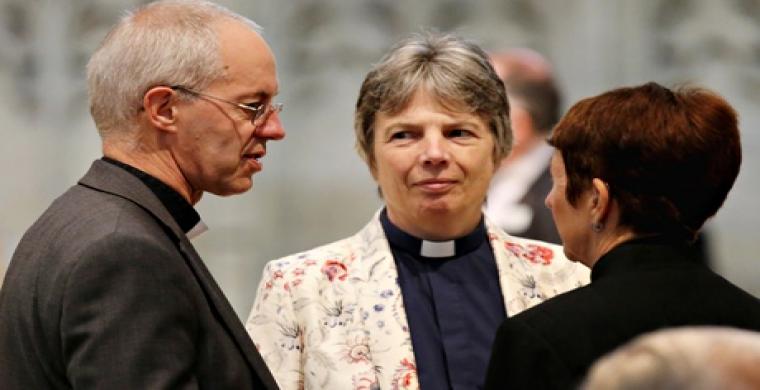Church of England General Synod expected to approve female bishops
Lay members likely to join clergy in backing change and first appointment could come this year, says Justin Welby
By Andrew Brown and Nicholas Watt
The Guardian
http://www.theguardian.com/
July 13, 2014
Archbishop of Canterbury Justin Welby with members of the female clergy at York Minster.
The Archbishop of Canterbury Justin Welby with members of the clergy at York Minster. Photograph: Christopher Furlong/Getty Images Europe
The Church of England's General Synod looks almost certain to vote through the legislation for female bishops on Monday with even a leading opponent now saying he would "put good money on it".
Canon Simon Killwick, chair of the synod's Catholic group, which opposes the move, said: "I think it will go through. I'd put good money on it. There is a much greater sense of trust and mutual respect and goodwill than there was the last time the synod voted." Nonetheless, he said, he would again vote against the measure.
The archbishop of Canterbury, Justin Welby, who has championed the proposals, said: "In my heart, I think we are OK."
Should the measure fail to get the two-thirds majority it needs among the synod's lay members – it is certain to pass the separate votes of bishops and clergy – Welby will consult with his fellow bishops as to what should be done and make an announcement as soon as possible.
Only six lay members need to have changed their minds since the last vote, in 2012, when proponents of female bishops failed by a small margin to gain the required majorities in all three voting sections of the synod. Soundings conducted by pressure groups and the Church Times suggest that this has happened, after simplified legislation was introduced that seemed to give both sides greater clarity.
A diocesan bishop, speaking on condition of anonymity, said: "Synod would be crackers not to vote for this. Bonkers is another word I would use. It will provoke such a crisis nationally if it fails to go through this time. It would do irreparable damage to the church. People will simply not think we're credible and we won't be."
But one senior supporter of women's ordination, who has a role in the selection of bishops, warned the vote would not solve the problems. "I'm very, very hopeful of the outcome," the source said, "but the hard work begins with the vote. A change of culture is extremely difficult. Institutions are by nature conservative."
Welby suggested on Sunday, in an interview on the Andrew Marr Show on BBC1, that the first woman bishop could be announced before Christmas. If the legislation goes through, that process will not be complete until parliament has approved it and returned the law to the synod's November meeting, when it will formally come into effect. As a result, it is quite likely that the first woman will be only an assistant bishop. For bureaucratic reasons it is unlikely that the process to choose a diocesan bishop will be completed between the middle of November and the end of the year.
In his Marr interview, Welby also praised some of his gay clergy, while refusing to say he had changed his mind on the issue of same-sex marriage. Two priests have recently married their same-sex partners, and one of them, Canon Jeremy Pemberton, has been unable to take up a job as a hospital chaplain because the acting bishop of Southwell and Nottingham will not give him a licence. "Pastorally you meet people, sit across the room from them, some wonderful priests. Your heart goes out to them," he said. "[But] I have not been convinced by the arguments for same-sex marriage as marriage."
The archbishop told Marr: "I continue to struggle with the issue. We are in the middle of a prolonged period of disagreement and conversation and therefore by definition it is unstable. That is something we have to deal with."
The archbishop, who first made his money as an oil executive, quoted the Bible as he spoke of the need to pay tax and not resort to aggressive tax avoidance. "Funnily enough, there is the passage in the Epistles to the Romans that says: pay your tax. People have a duty to make a proper contribution to society proportionate to their income. If they are doing very well they should be paying quite a lot. There have to be serious questions about some of these tax avoidance schemes."
He was sharply critical of the "hysteria" surrounding some discussion of Muslims. While he repudiated the view widely attributed to his predecessor, Rowan Williams, that sharia law could be accepted in England, he said: "I think we are in danger of slipping into a very fearful culture in which we see everyone against us and us against everyone and we are constantly trying to defend ourselves. This country is much bigger than that, much better than that.
"We have been becoming too hysterical about [Islam] for some considerable period. It is a worry because we have huge differences with Islam – as Christians. But that is absolutely no reason for hostility."
END














